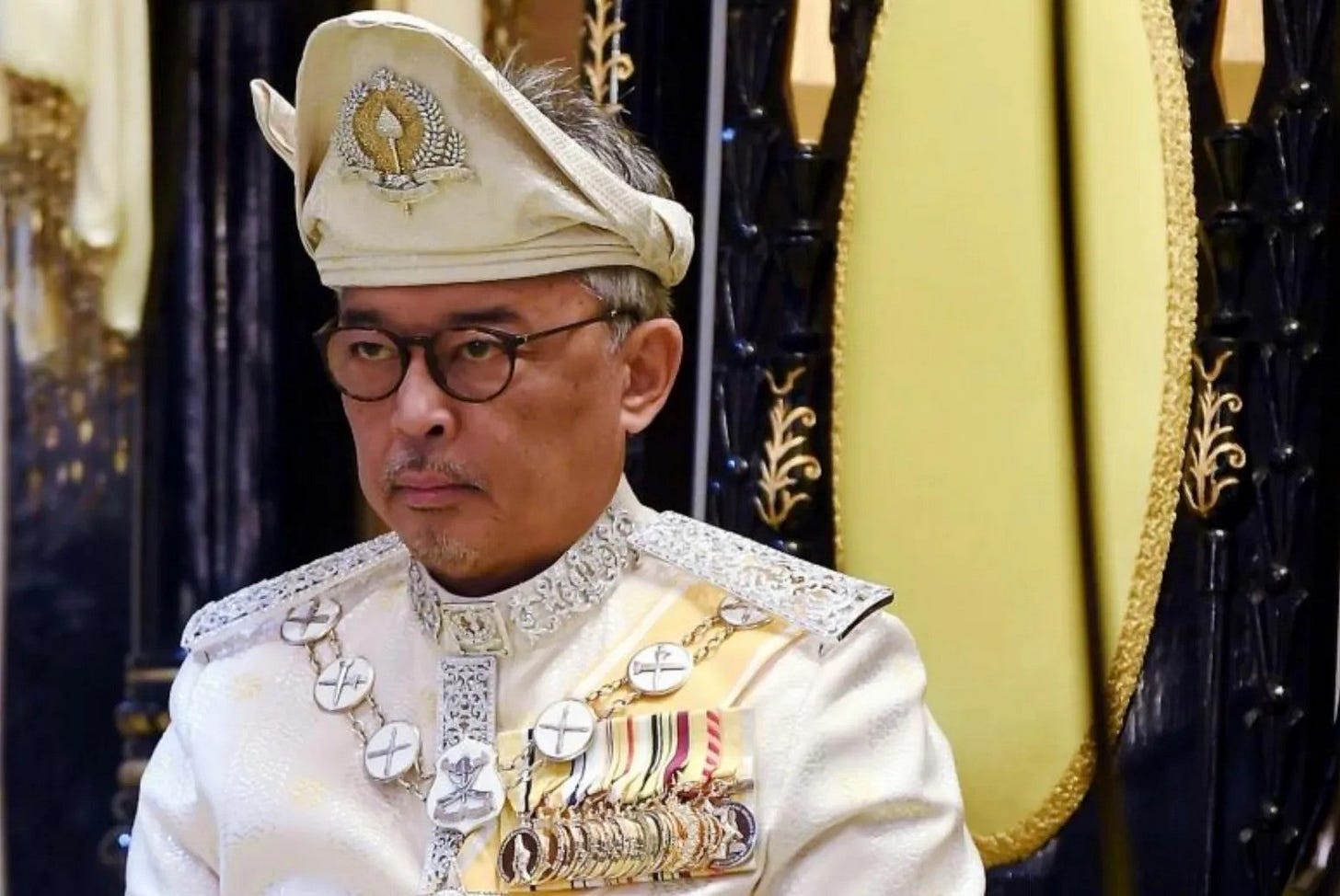Malaysia and the Proxy Fight Over Releasing Najib Razak
A mysterious addendum from the former king could free him
The confiscation last week of the laptop of RK Anand, the executive editor of the award-winning news portal Malaysiakini, is the tip of a political iceberg involving Khairy Jamaluddin, once the golden boy of the scandal-ridden United Malays National Organization who was kicked out of the party in January of 2023 after he called on the party’s leader, UMNO President Ahmad Zahid Hamidi, to resign.
The other part of the iceberg is a controversial document, signed by the previous king, granting house arrest to the country’s most notorious white-collar criminal, former Prime Minister Najib Razak. Any document involving Malaysia’s royalty is sacrosanct but freeing Najib is unthinkable to much of the population despite the wishes of UMNO warlords, who see Bossku, as they call him, as the key to the indelibly corrupt party’s regeneration.
After leaving politics, Khairy started the podcast Keluar Sekejap (Temporary Exit) in which he and Shahril Hamdan, a fellow UMNO outcast, discuss Malaysian politics and current affairs with a variety of guests and which almost immediately became the most popular podcast in Malaysia. He discussed the document. That is what has him in trouble.
“I guess the podcast got too popular,” said a Malay observer. “This is an attempt to pressure him into toning it down.” Najib is in prison for his role in the 2018 collapse of the government-backed investment fund 1Malaysia Development Bhd, but remains phenomenally popular with the Malay heartland. The royal addendum, which has been concealed for months by Prime Minister Anwar Ibrahim and others, has become a huge controversy because it gave permission from Sultan Abdullah of Pahang for Najib to serve the rest of his sentence under house arrest, which is tantamount to freeing him despite his role as the architect of the biggest financial scandal in the country’s history. News of the addendum has floated through Malaysia in politics for months.
Khairy, in his broadcast, alleged that the addendum had caused a crisis of trust within UMNO, which it has, between those who want Najib out and those who don’t because he would immediately become a potent force in Malay politics. Azalina Othman Said, the law and institutional reform minister, Khairy said, was one of those concealing the addendum. That sparked an immediate police report lodged by Azalina’s secretary and a criminal defamation investigation against Khairy for improper use of network facilities.
In turn, Malaysiakini reported the essence of Khairy’s broadcast and earned a police visit to the news site’s offices and a bout of questioning of Anand and others at police headquarters as well as a demand for access to Malaysiakini’s content management system, although the news site only reported what Khairy had said publicly – and what had been whispered for months.
International condemnation of the Malaysian government erupted, with Shawn Crispin, the senior Southeast Asia representative of the New York-based Committee to Protect Journalists calling the police seizure of Anand’s laptop “a clear and gross violation of press freedom” and demanding that his computer be returned to him unconditionally with this type of coercion stopping immediately.” Nalini Elumalai, senior Malaysia program officer of the global rights organization Article 19, called the seizure “part of a broader and alarming trend in Malaysia, where authorities are increasingly using vague and disproportionate laws and tactics to intimidate and silence critics.”
This is hardly new to Malaysiakini, which has been raided, its executives hauled in for police questioning, its equipment seized, its reporters blocked from covering government events almost since its birth in 1999. The episode is also a growing feature of Anwar’s Pakatan Rakyat government, which is increasingly hostile to the press, recently seeking changes to give more powers to the Malaysian Communications and Multimedia Commission (MCMC), which has been accused of increased blockages of news sites critical of the government. Other amendments grant the commission immunity from prosecution for transgressions against journalists.
While the affair does give some insight into the UMNO establishment’s irritation with Khairy, the son-in-law of former Prime Minister Abdul Ahmad Badawi and once expected to take on Zahid for the party presidency, the other issue is the existence of the addendum, which one political analyst called “a fiasco for the PM. The Najib addendum - which is legally unenforceable -- is the big issue. The royals and Anwar fucked up big time with their handling of it. Legally, Najib should rot in jail for a long time. But Anwar would like him out for his own political survival given Najib’s popularity with the base. Knowing Malaysia, Anwar, the royals, and the recently appointed Attorney General may still force their will to put Najib under house arrest. Not likely I think - but very possible.”
From the start, the incendiary issue of Najib’s freedom has been badly handled. His petition for clemency was heard on the last day of the previous king’s reign. The January 29, 2024 decision to cut Najib’s 12-year sentence in half was announced and turned out to be seriously unpopular, raising questions whether the king’s prerogatives extended to reducing the prison term and fine. although, given the unquestioning national obeisance to the royalty, it was accepted and grudgingly respected. The addendum became a badly kept secret.
The Pahang sultan’s term ended and the Johor Sultan Ibrahim Iskandar was installed amid rumors of its existence and its promise of freedom for Najib. Months passed until that was finally acknowledged in mid-January. The fight is now on with the UMNO old guard demanding Najib’s freedom, although he faces other additional court action in the 1MDB scandal, which cost the Malaysian taxpayers US$5.4 billion. Given the current political atmosphere, he appears unlikely to ever come to trial on the additional charges, or a fairly credible accusation he ordered the murder of a Mongolian beauty in the middle of another scandal.
Khairy, for instance, got kicked out of the party for challenging Zahid, when Zahid was appointed deputy prime minister in the middle of his trial on 47 counts of criminal breach of trust, abuse of power, and money laundering involving a total of RM114 million (about US$25.4 million) funds of Yayasan Akalbudi, the charity he started seemingly for the purpose of looting it. It is unlikely the trial will ever resume.
Khairy, out of politics despite having once been called UMNO’S ‘messiah,’ is coy about ever reentering, although he describes UMNO as “an old house with good bones” that only needs a remodel. The title of his podcast, “Temporary Exit” in English, might give a clue. At 49, he is young for a Malay politician and there are few faces in Malay politics who haven’t been branded as irredeemably corrupt.
“The charge against Khairy is an attempt to pressure him into toning it down,” said a politically astute source who asked not to be named. “This guy, no matter how they try, he keeps popping back up. It’s a question if he can mobilize the ‘backroom boys’ (the group of young officials who dominated Ahmad Badawi’s reign). He has made inroads into the grassroots. But UMNO is a game of warlords and he is not a warlord.”





